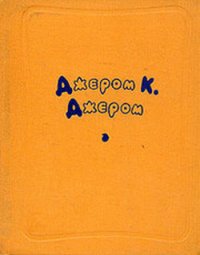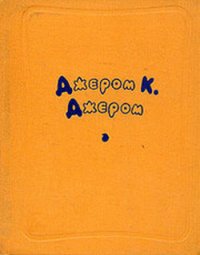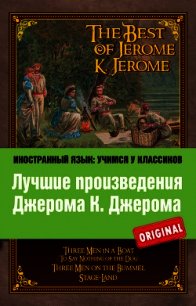My First Book - Jerome Jerome Klapka (читать книги онлайн полностью без регистрации .TXT) 📗

Poor 'Physiological ?sthetics' had a very hard fate. When I come to look back upon the circumstances calmly and dispassionately now, I'm not entirely surprised at its unhappy end. It was a good book in its way, to be sure, though it's me that says it as oughtn't to say it, and it pleased the few who cared to read it; but it wasn't the sort of literature the public wanted. The public, you know, doesn't hanker after philosophy. Darwin, and Herbert Spencer, and the Editor of Mind, and people of that sort, tried my work and liked it; in point of fact, my poor little venture gained me at once, an unknown man, the friendship of not a few whose friendship was worth having. But financially, 'Physiological ?sthetics' was a dead failure; it wasn't the sort of work to sell briskly at the bookstalls. Mr. Smith would have none of it. The reviews, indeed, were, almost without exception, favourable; the volume went off well for a treatise of its kind—that is to say, we got rid of nearly 300 copies; but even so, it left a deficit of some forty or fifty pounds to the bad against me. Finally, the remaining stock fell a victim to the flames in Mr. Kegan Paul's historical fire, when many another stout volume perished: and that was the end of my magnum opus. Peace to its ashes! Mr. Paul gave me 15l. as compensation for loss sustained, and I believe I came out some 30l. a loser by this, my first serious literary venture. In all these matters, however, I speak from memory alone, and it is possible I may be slightly wrong in my figures.
But though 'Physiological ?sthetics' was a financial failure, it paid me in the end, both scientifically and commercially. Not only did it bring me into immediate contact with several among the leaders of thought in London, but it also made my name known in a very modest way, and induced editors—those arbiters of literary fate—to give a second glance at my unfortunate manuscripts. Almost immediately after its appearance, Leslie Stephen (I omit the Mr., honoris causa) accepted two papers of mine for publication in the Cornhill. 'Carving a Cocoanut' was the first, and it brought me in twelve guineas. That was the very first money I earned in literature. I had been out of work for months, the abolition of my post in Jamaica having thrown me on my beam-ends, and I was overjoyed at so much wealth poured suddenly in upon me. Other magazine articles followed in due course, and before long I was earning a modest—a very modest—and precarious income, yet enough to support myself and my family. Moreover, Sir William Hunter, who was then engaged on his gigantic 'Gazetteer of India,' gave me steady employment in his office at Edinburgh, and I wrote with my own hand the greater part of the articles on the North-West Provinces, the Punjaub, and Sind, in those twelve big volumes.
Meanwhile, I was hard at work in my leisure moments (for I have sometimes some moments which I regard as leisure) on another ambitious scientific work, which I called 'The Colour-Sense.' This book I published on the half-profits system with Trubner. Compared with my first unhappy venture, 'The Colour-Sense' might be counted a distinct success. It brought me in, during the course of about ten years, something like 25l. or 30l. As it only took me eighteen months to write, and involved little more than five or six thousand references, this result may be regarded as very fair pay for an educated man's time and labour. I have sometimes been reproached by thoughtless critics for deserting the noble pursuit of science in favour of fiction and filthy lucre. If those critics think twenty pounds a year a sufficient income for a scientific writer to support himself and a growing family upon—well, they are perfectly at liberty to devote their own pens to the instruction of their kind without the slightest remonstrance or interference on my part.
I won't detail in full the history of my various intermediate books, most of which were published first as newspaper articles, and afterwards collected and put forth on a small royalty. Time is short, and art is long, so I'll get on at once to my first novel. I drifted into fiction by the sheerest accident. My friend, Mr. Chatto, most generous of men, was one of my earliest and staunchest literary supporters. From the outset of my journalistic days, he printed my articles in Belgravia and the Gentleman's Magazine with touching fidelity; and I take this opportunity of saying in public that to his kindness and sympathy I owe as much as to anyone in England. Some people will have it there is no such thing as 'generosity' in publishers. I beg leave to differ from them. I know the commercial value of literary work as well as any man, and I venture to say that both from Mr. Chatto and from Mr. Arrowsmith, of Bristol, I have met, time and again, with what I cannot help describing as most generous treatment. One day it happened that I wanted to write a scientific article on the impossibility of knowing one had seen a ghost, even if one saw one. For convenience sake, and to make the moral clearer, I threw the argument into narrative form, but without the slightest intention of writing a story. It was published in Belgravia under the title of 'Our Scientific Observations on a Ghost,' and was reprinted later in my little volume of 'Strange Stories.' A little while after, to my immense surprise, Mr. Chatto wrote to ask me whether I could supply him with another story, like the last I had written, for the Belgravia Annual. I was rather taken aback at this singular request, as I hadn't the slightest idea I could do anything at all in the way of fiction. Still, like a good journalist, I never refuse an order of any sort; so I sat down at once and wrote a tale about a mummy on the ghastliest and most approved Christmas number pattern. Strange to say, Mr. Chatto again printed it, and, what was still more remarkable, asked for more of the same description. From that time forth, I went on producing short stories for Belgravia; but I hardly took them seriously, being immersed at the time in biological study. I looked upon my own pretensions in the way of fiction as an amiable fad of my kind friend Chatto; and not to prejudice any little scientific reputation I might happen to have earned, I published them all under the carefully veiled pseudonym of 'J. Arbuthnot Wilson.'
I would probably never have gone any further on my downward path had it not been for the accidental intervention of another believer in my powers as a story-writer. I had sent to Belgravia a little tale about a Chinaman, entitled 'Mr. Chung,' and written perhaps rather more seriously and carefully than my previous efforts. This happened to attract the attention of Mr. James Payn, who had then just succeeded to the editorship of the Cornhill. I had been a constant contributor to the Cornhill under Leslie Stephen's management, and by a singular coincidence I received almost at the same time two letters from Mr. Payn, one of them addressed to me in my own name, and regretting that he would probably be unable to insert my scientific papers in his magazine in future; the other, sent through Chatto & Windus to the imaginary J. Arbuthnot Wilson, and asking for a short story somewhat in the style of my 'admirable Mr. Chung.'

Encouraged by the discovery that so good a judge of fiction thought well of my humble efforts at story-writing, I sat down at once and produced two pieces for the Cornhill. One was 'The Reverend John Creedy'—a tale of a black parson who reverted to savagery—which has perhaps attracted more attention than any other of my short stories. The other, which I myself immensely prefer, was 'The Curate of Churnside.' Both were so well noticed that I began to think seriously of fiction as an alternative subject. In the course of the next year I wrote several more sketches of the same sort, which were published, either anonymously or still under the pseudonym, in the Cornhill, Longmans', The Gentleman's, and Belgravia. If I recollect aright, the first suggestion to collect and reprint them all in a single volume came from Mr. Chatto. They were published as 'Strange Stories,' under my own name, and I thus, for the first time, acknowledged my desertion of my earliest loves—science and philosophy—for the less profound but more lucrative pursuit of literature.




